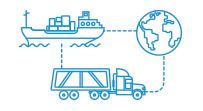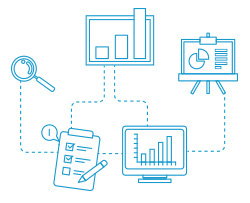The Fuel Tax Credit system as we currently know it was introduced in July 2003, replacing the previous Diesel Fuels Rebate Scheme.
 In general, the scheme has been a slowly changing set of rules designed to provide credits to eligible businesses impacted by the excise charged by the Government.
In general, the scheme has been a slowly changing set of rules designed to provide credits to eligible businesses impacted by the excise charged by the Government.
Like excise on alcohol, the excise on fuel is increased twice a year, generally around the start of February and the start of August each year.
As the Fuel Tax Credits (FTC) are a subsidy for eligible businesses against the excise charged, this increase in excise also means a change in Fuel Tax Credits available for those periods.
For businesses that are eligible for Fuel Tax Credits, the twice-yearly change in excise results in a need to correctly record eligible fuel usage, to ensure when the BAS is prepared, the correct claim for Fuel Tax Credits are made.
Additionally, businesses should regularly review the types of fuels being used, how they are being used and the nature of the business being undertaken.
In particular, a business should review the nature of their trading activities to confirm they are still eligible, or if their business has changed to include new enterprises.
Under the Fuel Tax Credit system, the business use will determine the rebate calculated.
For example, ABC Pty Ltd operates a farming venture. They can claim diesel used in an agriculture business at a rate of 43.3 cents per litre for the December quarter. However, if they expanded the business to use the equipment for heavy vehicle transport on public roads, they would only receive 16.9 cents per litre of diesel used.
It is a significant difference in the Fuel Tax Credit that can be claimed on the business BAS.
It is also advisable for businesses to consider the use of eligible fuels in a business through other equipment.
 The activities that give rise to a Fuel Tax Credit have been extended considerably in recent years, as have the activities at the highest rate.
The activities that give rise to a Fuel Tax Credit have been extended considerably in recent years, as have the activities at the highest rate.
Fuel used in light vehicles, off-road in particular, is often overlooked.
Additionally, due to the nature of vehicles, there is complexity as to how fuel is used.
Some vehicles, such as cranes, cement trucks, and refrigerated transport have a fuel use that is used across multiple fuel business use categories.
To ensure a business can legitimately claim the Fuel Tax Credits it is entitled to, it’s important to make sure you have in place a good record-keeping system.
A business will need to be able to substantiate its claims to show a record of the fuel acquired, the use of that fuel while carrying on a business and the basis and method of calculation of use.
FOR MORE INFORMATION
If you want to discover more on if you are eligible for Fuel Tax Credits, talk to your local RSM advisor or contact your local RSM office today.


